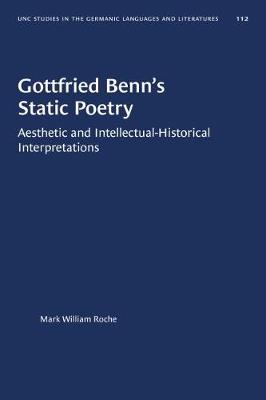University of North Carolina Studies in Germanic Languages and Literature
1 total work
This book consists of close readings of four poems illustrating Gottfried Benn's developing conception of stillness or stasis: Trunkene Flut (1927), Wer allein ist-- (1936), Statische Gedichte (1944), and Reisen (1950). Mark Roche pays particular attention to the interrelation of form and content, and he uncovers previously overlooked allusions to thinkers such as Aristotle, Seneca, and Meister Eckhart.
Benn's supposedly pure poetry of stasis is in reality an expression of opposition to nazi ideology, Roche argues, and should be viewed in the context of inner emigration. Nevertheless, Benn's opposition to nazism unwittingly rests on the same decisionistic foundation as the power positivism he deplores. Benn's well-intentioned critique of nazism is ultimately unsuccessful. The book concludes with a theoretical postscript that suggest ways in which intellectual history could be made productive for literary interpretation and provides arguments in favor of an aesthetic analysis attentive to both formal structures and philosophical coherence.
Benn's supposedly pure poetry of stasis is in reality an expression of opposition to nazi ideology, Roche argues, and should be viewed in the context of inner emigration. Nevertheless, Benn's opposition to nazism unwittingly rests on the same decisionistic foundation as the power positivism he deplores. Benn's well-intentioned critique of nazism is ultimately unsuccessful. The book concludes with a theoretical postscript that suggest ways in which intellectual history could be made productive for literary interpretation and provides arguments in favor of an aesthetic analysis attentive to both formal structures and philosophical coherence.
